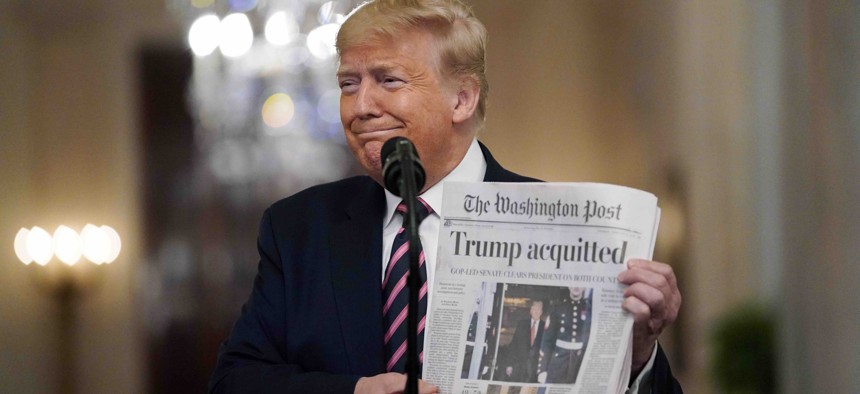State Lawmaker Pushes Measure to Declare CNN and Washington Post ‘Fake News’

President Donald Trump holds a copy of The Washington Post as he speaks in the East Room of the White House, Thursday, Feb. 6, 2020, in Washington. Trump has described the news outlet and others as "fake news" during the course of his presidency. AP Photo/Evan Vucci
The Tennessee representative delayed discussion on the resolution this week.
A Tennessee lawmaker wants his fellow legislators to officially recognize CNN and The Washington Post as “fake news.”
Republican state Rep. Micah Van Huss introduced the resolution late last month, but postponed a committee discussion on it on Tuesday. The measure appears to reference a Post editorial and a CNN segment from last year that focused mostly on a book, “The Cult of Trump: A Leading Cult Expert Explains How the President Uses Mind Control”.
Language throughout the two-page proposal takes issue with the characterization of Trump supporters as cult-like. It also criticizes “fake news outlets” that “suggest ideas without directly making accusations so that they can claim innocence from their ivory towers.”
“Suggestions that supporters of President Trump are exhibiting cult-like behavior isn’t helpful in an era of significant political polarization,” one of the “whereas” clauses in the resolution says.
It concludes by saying that Tennessee recognizes CNN and the Post, as “fake news” and “part of the media wing of the Democratic Party.” It goes on to “condemn” the news outlets for “denigrating our citizens and implying that they are weak-minded followers instead of people exercising their rights that our veterans paid for with their blood.”
As of Wednesday afternoon, the measure—House Joint Resolution 779—had 14 Republican co-sponsors.
It was teed up for discussion on Tuesday at a hearing of the House Judiciary Committee’s Constitutional Protections and Sentencing Subcommittee, which Van Huss chairs. But when the resolution came up on the agenda, Van Huss moved to delay it until next week.
Trump throughout his time in office has been combative towards the media, branding various journalists and media organizations as “fake news” and the “enemy of the people.”
Between announcing his candidacy for president in 2016 and the end of his second year in office, Trump sent at least 1,339 tweets about the media that were critical, insinuating, condemning, or threatening, according to the Committee to Protect Journalists.
The Committee, along with Trump critics, and news outlets, cite examples of how these sorts of actions by the president can have damaging effects, like giving authoritarian leaders in other countries a justification for taking aggressive and threatening action against journalists, or emboldening state and local officials here in the U.S. to reduce media access and transparency.
Van Huss was first elected to his seat in 2012 and his current term ends in November. He represents a district in eastern Tennessee that extends north and west of Johnson City. Last year, he drew attention for sponsoring a controversial bill to restrict access to abortions.
On Wednesday, a message left at Van Huss' office seeking comment on his "fake news" proposal was not returned. But he has said on social media that he introduced the measure “on behalf of a constituency that's tired of fake news and Republicans who don't fight.”
Bill Lucia is a senior reporter for Route Fifty and is based in Olympia, Washington.
NEXT STORY: How States Are Battling Other States’ Travel Bans






